 About GamePeople
About GamePeople
Subscribe to the Story Gamer column:![]() RSS or
RSS or
![]() Newsletter.
Newsletter.
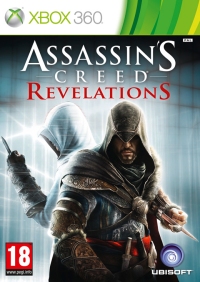
Format:
360
Genre:
Adventuring
Style:
Singleplayer
Thirdperson
Competitive
Cooperative
Buy/Support:
Support Mark, click to buy via us...
Other GamePeople columnists have reviewed this from their perspective - huh?:
Dressup Gamer (360)
Multiplayer Gamer (360)
Reporting Gamer (360)
Tired Gamer (360)
Novel Gamer (360)
Novel Gamer (PS3)
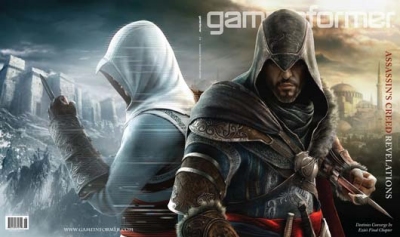
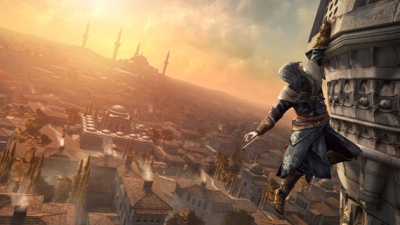
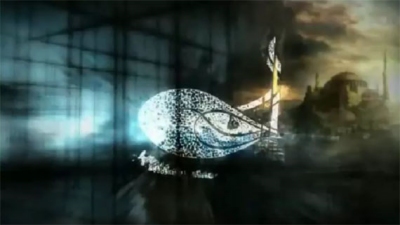
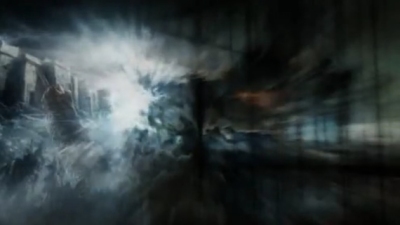
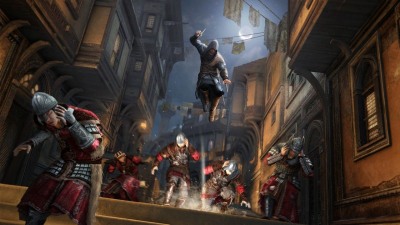
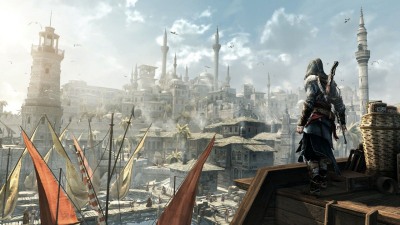
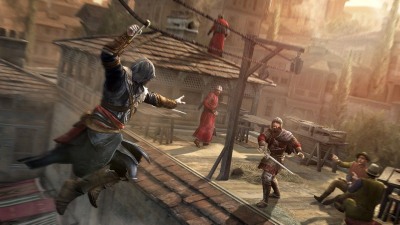
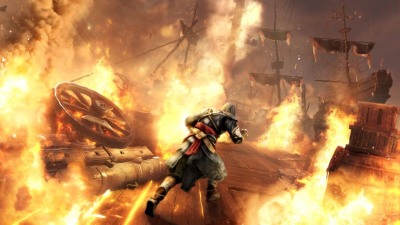

Further reading, films and books that create similar stories:
Assassin's Creed Revelations 360 sees Ezio getting older, and the series itself seems to be showing signs of age. Although Revelations feels a little tired in places, it still provides satisfying closure for Ezio and Altair's stories.
Perhaps unsurprisingly, very few videogames address the issue of aging, even though it comes to us all and is a central theme of many stories in other media. Like comic book and cartoon characters, the stars of videogames need never age or die, and indeed can't be allowed to if they're to entrance new generations of juvenile gamers and keep raking in the cash.
Mario will outlive us all, that ageless, unchangingly charmless grin beaming out into cold eternity.
The Assassin's Creed games, rooted as they are in the use of historical settings as well as ideas of ancestry and lineage, have a rather different relationship to mortality.
It's woven into the concept of the series that Desmond Miles' ancestors, Altair and Ezio, are long-dead, their lives only accessible through the memories imprinted in Desmond's DNA.
The historical trappings of these stories also require characters to age, as years are skipped over to segue from one interesting historical event to another.
Take Revelations, which sees Ezio arriving in Constantinople in 1511, during the last years of Sultan Bayezid II. The uncertainty over who will inherit the throne of the Ottoman Empire creates a tense political backdrop to the usual intrigue, as does the legacy of the city's history as a part of the Byzantine Empire.
Constantinople in 1511 is a city both historically and geographically on the border between east and west, the Islamic world and Christendom, and the tension between these two empires acts as one of many call backs to the original Assassin's Creed.
Mario will outlive us all, that ageless, unchangingly charmless grin beaming out into cold eternity.
It's a dramatic period to set a game in, and allows Ubisoft to involve fascinating historical figures like the future Suleiman I, at this point a student and nephew to the Sultan, as supporting characters.
It also places Ezio Auditore firmly in middle age and while he still, barring injuries, runs, jumps and pounces on guards like a much younger man, he still exhibits the grey hairs and weariness of someone who has spent thirty-odd adult years... well, running and jumping and pouncing on guards.
Ezio is a more contemplative character this time around, and has come a long way from the hot-blooded young man of Assassin's Creed II. There's an economy to his actions, including his brutally efficient takedowns, that speaks to Ezio's age and experience.
In cut scenes and dialogue it's made clear that Ezio is still dedicated to the work of the assassins but uncertain of the legacy he will leave behind, and has an increasing awareness of the normal life that he has been unable to have due to his role within the assassins.
This theme, of the choices we make in life between duty and family, between wider responsibilities and a home life, is reinforced by interludes revisiting Altair, the lead character from the first Assassin's Creed, at various points in his life, from his youth right through to the very end.
It's ambitious stuff, surprisingly contemplative for an action game. By showing us the entirety of Altair's life, as well as bringing Ezio's role in the ongoing story to a close, Ubisoft contextualise the action of the game within a broad sweep of history, which gives the series scope but also risks making the actual actions undertaken by the player seem relatively minor in the grander scheme, both real and fictional.
It's ambitious stuff, surprisingly contemplative for an action game.
Rather than giving the player a god-like agency and mastery of the world around them, Revelations has both Altair and Ezio facing the fact that they are part of something bigger than themselves, that they will never know the full extent of what they have been a part of and must pass their responsibilities on to future generations.
If this thematic maturity is welcome, then less welcome are the signs that the Assassin's Creed series itself is starting to show, if not signs of decrepitude, then a degree of middle-aged spread.
The signs of aging are subtle. In many ways Revelations sees a series that's still in its prime. An opening sequence that sees a lot of talk, some passionless exploration and a clunky vehicle section brings Ezio to Constantinople and gets into its stride.
Constantinople is an interesting setting, albeit only cosmetically different from the European instalments, and lacks the hilly geography that made Brotherhood's Rome such a pleasure to navigate. Ubisoft have littered the environment with side quests and excuses to climb the cities many minarets, so there's plenty to dig into in terms of collectibles and distractions.
Once I'd settled in, I found the exploratory phase of the game, the comfortable rhythm of steadily exploring a large city, unlocking areas and building up assets as utterly hypnotic as was in previous titles, and Mediterranean Defence - the improved version of Brotherhood's Assassinship Manager sub-game - utterly addictive.
I found the exploratory phase of the game utterly addictive.
It's all quite familiar to a series veteran, and while I had many late nights happily taming Constantinople and building up my gang of assassins, I couldn't say I was surprised by the game very often.
Perhaps aware of this slide into cosy familiarity, Revelations adopts a few fashionable innovations to try and seem up to date. Den Defence is definitely a case of trying a bit too hard to stay current, a tower defence sub-game that's competently executed but fits uneasily with the rest of the game.
More successful is the RPG-style Bomb Crafting mechanic. Far from essential - you can just ignore it altogether once you've completed the memory that introduces the basic principles - there's nonetheless some fun to be had in creating a highly explosive sticky grenade, throwing it at a guard's back and watching the carnage unfold.
Elsewhere, the game shows another sign of age, an obsession with revisiting the past, as the game digs through the personal histories of both Altair and present day protagonist Desmond Miles.
The Altair levels are the more straightforward, recapping the stripped down action of the first game. It's satisfying to revisit Altair at different points in his life, and in character terms these interludes are great, but in terms of gameplay they're a bit confined, sticking to the same locations and channeling the player through a very narrow path.
The final sequences are touching without descending into an uncharacteristic sentimentality.
The Desmond memories are an even starker contrast between good storytelling and lower quality gameplay, as Desmond narrates his own life over abstract first person gameplay sequences as he negotiates an angular virtual world. It's an interesting, abstract approach to digging into the character, with some striking moments as images from Desmond's life are projected into the Tron-like environment, but the first person physics puzzling feels like a desperately fumbled attempt to do something akin to Portal.
It's a good job, then, that the core gameplay remains strong, and the central Ezio plot builds to a satisfying resolution with a couple of great action set-pieces that are as good as anything the series has done to date. The game then cranks back the pace once more, with a slower phase that emotionally resolves a lot of storylines, then ends on an epic cut scene that fills in a lot of backstory and paves the way for the next stage in Desmond's journey.
In the end, for all the game's flaws, there's undoubted resonance to a game that draws together and concludes Altair and Ezio's roles in the Assassin's Creed storyline, and the final sequences for those characters are touching without descending into an uncharacteristic sentimentality. We have seen these characters through four sprawling games and their entire fictional lives, and the stoicism and sense of duty they display right to the end is genuinely affecting.
A very satisfying conclusion and essential for that story closure alone.
Assassin's Creed: Revelations doesn't offer any big gameplay innovations, and a lot of it will be overly familiar to players only casually interested in the series. They might want to hang on for next year's Assassins Creed III, which promises to be as big a step-change in the series' evolution as II.
However, for fans like me who have really committed to these games and characters, Revelations is a very satisfying conclusion to the adventures of Ezio Auditore da Firenze, and is essential for that story closure alone.



Mark Clapham writes the Story Gamer column.
"I love a good story. Games tell many different stories: the stories told through cut scenes and dialogue, but also the stories that emerge through gameplay, the stories players make for themselves."
Here are the games I've been playing recently:
© GamePeople 2006-13 | Contact | Huh?

|
Family Video Game Age Ratings | Home | About | Radio shows | Columnists | Competitions | Contact
With so many different perspectives it can be hard to know where to start - a little like walking into a crowded pub. Sorry about that. But so far we've not found a way to streamline our review output - there's basically too much of it. So, rather than dilute things for newcomers we have decided to live with the hubbub while helping new readers find the columnists they will enjoy. |
Our columnists each focus on a particular perspective and fall into one of the following types of gamers:
|